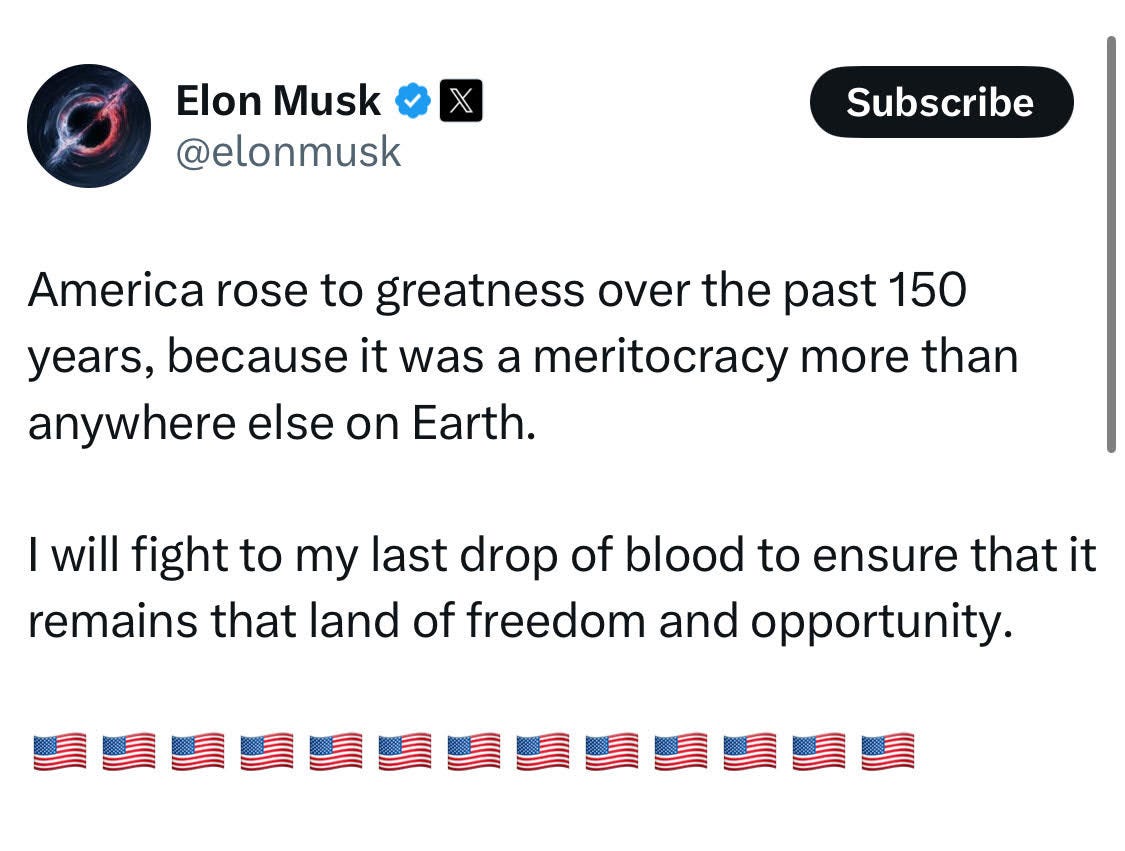DEI, Reparations & the Myth of Meritocracy
If descendants of slaves can't get reparations because they were never enslaved, then descendants of the rich can't receive inheritances because that's money they never worked for...
Diversity, Equity & Inclusion (DEI) has become a rallying cry for both Elon Musk and Donald Trump, galvanizing the MAGA movement around the idea that DEI is a form of reverse racism. The working theory is that DEI steals opportunities from heterosexual white men and gifts them to unqualified women, “Latinos,” Native Americans, LGBTQ individuals, Black immigrants, and ADOS (American Descendants of Slavery). This reaction is hardly surprising, as Musk—despite being the richest man in the world—still sees himself as a victim of an anti-white construct. It is a phenomenon I call victim envy, in which the beneficiaries of racist systems and institutions attempt to shame actual victims, accusing them of playing the race card or being trapped in victimhood, only to later declare themselves victims of reverse discrimination.
We see this phenomenon at play in Musk’s confrontation with the South African government, which is not so much trying to "catch a predator" as it is preventing itself from being revictimized. Naturally, Black South Africans harbor a trust deficit after their history of oppression at the hands of the white minority. In response, South Africa’s Electronic Communications Act mandates that electronic communications networks maintain at least 30% equity ownership by individuals from historically disadvantaged groups to operate. Seems generous.
My issue with America’s version of DEI, however, is that it distributes opportunities based on identity rather than harm. Affirmative action was originally intended as a form of redress for ADOS but instead became a multiracial, gender bendering, white women’s job program, in which the justifiable standard of multigenerational oppression was replaced by broad identity categories. That being said, Musk's accusations of reverse racism remain diabolical, especially given his father Errol Musk’s recent interviews, in which he openly admitted to financially seeding his son’s early career.
Yet, in strident contradiction, Elon insists he is a self-made man, denying that he benefited from his father’s emerald mines, his whiteness, or the dumb luck of being born into the right family at the right time. Isn’t it strange how the main beneficiaries of inheritance either fail to appreciate their advantages or outright lie about having received them? The self-made man justificatory narrative has become the most popular biographical revision among the multi-millionaire and billionaire class. This asset class justifies itself—and the growing inequality their wealth creates—through this narrative, even in the face of overwhelming contradictory evidence.
“He really is a genius when it comes to material properties, when it comes to engineering,” said Musk’s biographer, Walter Isaacson. But the primary driver of Musk’s success is not genius—it’s inheritance and handouts. The Washington Post reported in February that “Musk and his businesses have received at least $38 billion in government contracts, loans, subsidies, and tax credits, often at critical moments.”
Musk’s life is perhaps the greatest threat to meritocracy the world has ever seen because it rewards biology over ability. For the poor, this is an arrangement in which the wealthy have seized control of wealth and nearly all of the opportunities that flow from it, suffocating the kindling flame of aspiration that leads to achievement. It is not the DEI hire who is gaining an upper hand in the job market—it is the child born into wealth and status. This is why economists Thomas Piketty, Emmanuel Saez, and Gabriel Zucman argue that high taxation on wealth and inheritance is the proper way to structure a truly meritocratic society. From Rethinking Capital and Wealth Taxation:
“The proper way to tax billionaires is through a progressive wealth tax. Finally, because individuals do not choose their parents, there are strong meritocratic reasons why we should tax inherited wealth more than earned income or self-made wealth, for which individuals are at least partially responsible. This implies that the ideal fiscal system should also include a progressive inheritance tax, in addition to progressive income and wealth taxes.”
To reiterate my earlier point, inheritance is a reward for luck. Thus, meritocratic societies should seek to reduce inheritances so that people succeed or fail based on their own actions, not the work and residual income of dead relatives. One of the most overused objections to slavery reparations is that descendants of enslaved people were never enslaved themselves and are therefore not entitled to reparations. The debt, critics argue, dies with the enslaved.
If this is true, then it must also be true that the children of the wealthy are ineligible to inherit the fortunes of their ancestors. They didn’t do the work. The wealth should die with Daddy Warbucks.
However, because any wealth or inheritance tax implemented today would not be retroactive—meaning those already wealthy would be allowed to keep their fortunes—it is only fair that reparations be understood as a corrective economic action to reclaim the wealth that the descendants of slavery never received. Reparations are a fulfillment of every American’s right to life, liberty, and the pursuit of happiness. To the extent that America’s laws and culture have strayed from these values, it is the responsibility of lawmakers to ameliorate the consequences of that failure. If America and its lawmakers are truly serious about fostering a meritocracy, then reparations for ADOS should serve as the prototype for such a rehabilitative project, whereas the existence of billionaires like Musk stands as an extreme departure from America’s meritocratic values.






Historically, wealth was held in check by hefty taxation. Billionaire status should have never ever been allowed to exist. Such a 'thing' should not exist.
Tax the weathy!!!!
Here's a case of black employees being discriminated in an anti-discrimination lawsuit (second to last sentence).
https://www.reuters.com/technology/google-pay-28-million-settle-claims-it-favored-white-asian-employees-2025-03-18/